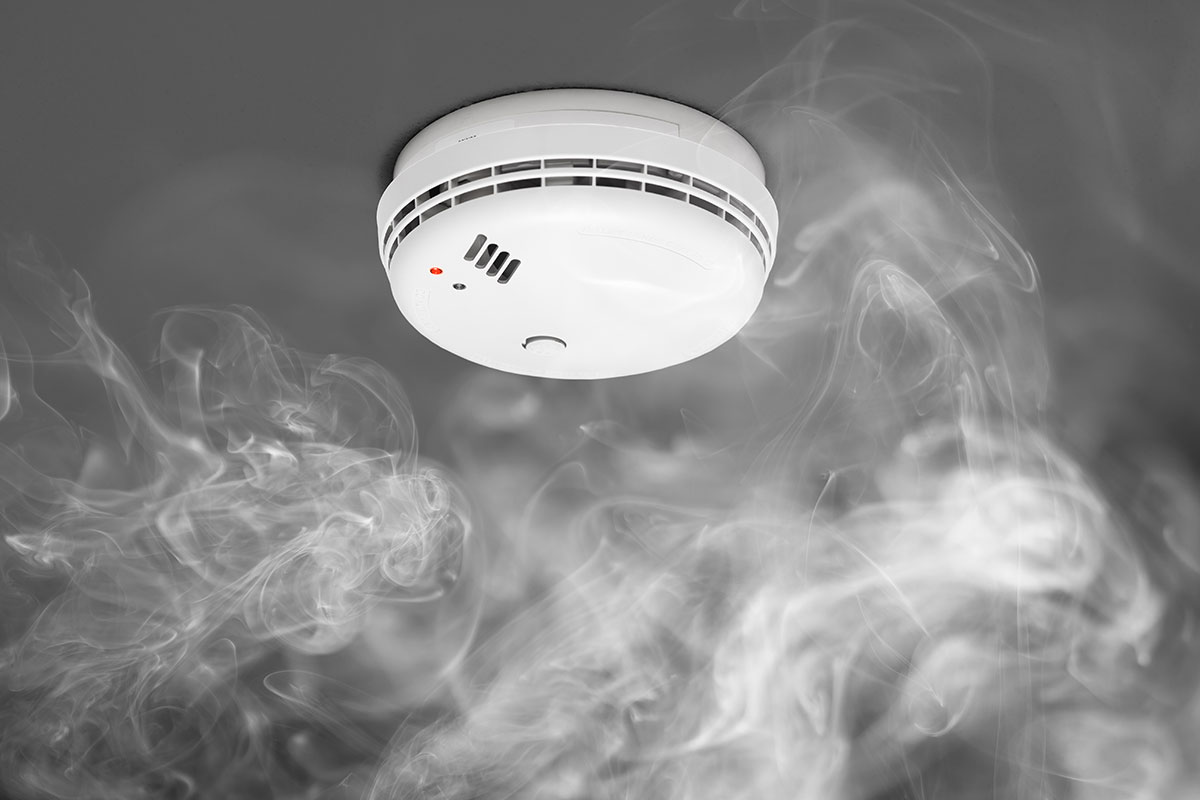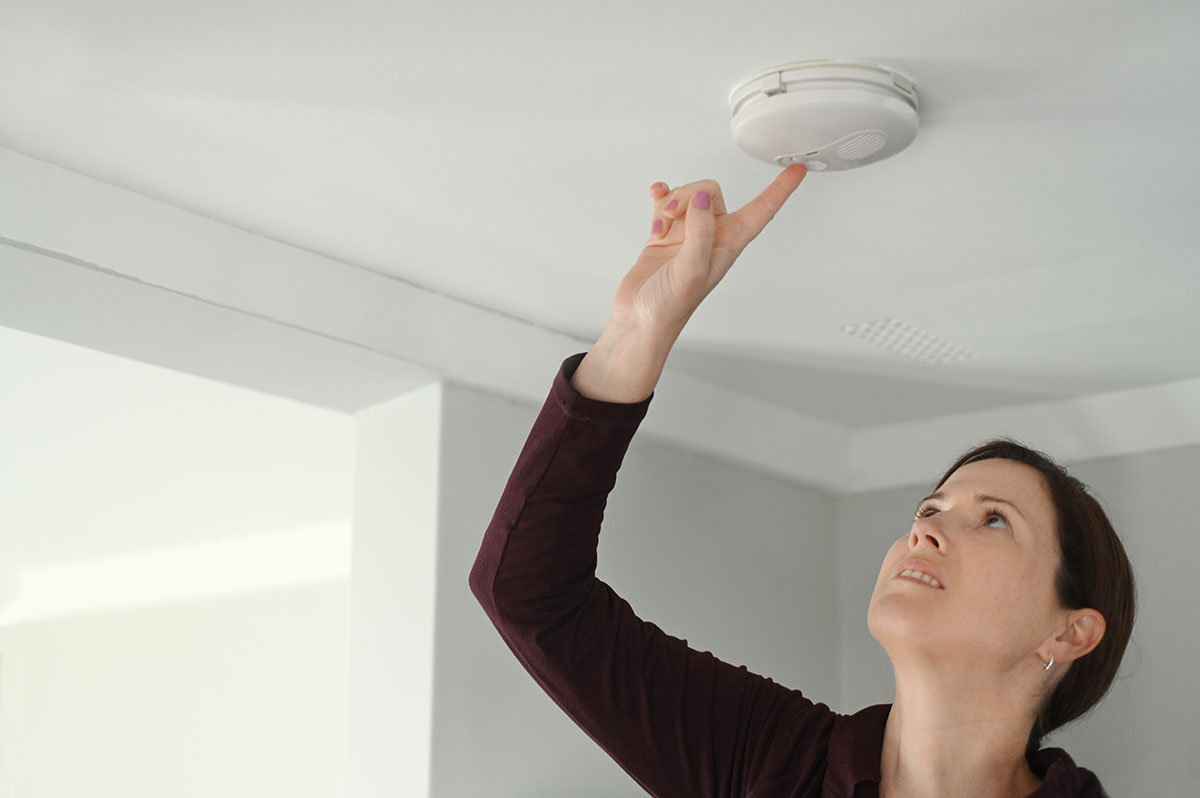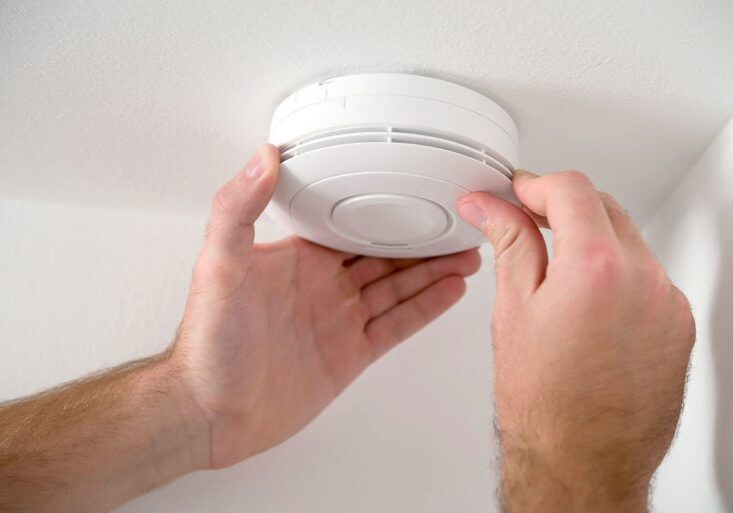Did you know the most dangerous aspect of a house fire is smoke inhalation? If you are sleeping, you may not notice the smell of smoke until it is too late. That’s why a working smoke detector is crucial.
Extensive research conducted by Fire and Rescue NSW (FRNSW) proves the critical role smoke alarms play in maintaining a safe home.
It’s clear having a smoke alarm is vital for keeping you, your family, and your home safe. In this guide to smoke alarms, I’ll cover:
- WA smoke alarm laws
- Where to install smoke alarms
- Where not to install smoke alarms
- Smoke alarm laws for landlords in Western Australia
- Types of smoke alarms
- Smoke alarm maintenance
- Smoke alarm testing
WA Smoke Alarm Laws
WA properties must be in compliance with a variety of smoke alarm regulations. Here are the mandatory smoke alarm laws in WA:
- Smoke alarms in new homes constructed after 1997 must be connected to the main power (240V hard-wired smoke alarms)
- Smoke alarm installation must be completed by a licensed electrician
- Battery-powered smoke alarms may be suitable in situations where wiring or mains power isn’t possible
For more tips on preventing fires in a home, see WA’s Department of Fire and Emergency Services resource page here: Preventing a Fire in the Home.
-
Smoke Alarm Placement in WA
Here are general rules regarding proper smoke alarm placement:
- Install a smoke alarm on every level of the home, including the basement
- Install a smoke alarm in every bedroom
- Install a smoke alarm in all essential areas (i.e. living room, dining room, family room, etc.)
- Install a smoke alarm outside sleeping areas
- Smoke alarms should be installed in the centre of the ceiling and at the proper distance from the ceiling
- Install a smoke alarm in rooms where electrical appliances or heaters are used
- Install a smoke alarm in the hallway closest to the bedrooms
- If your home has multiple stories, install a smoke alarm between each level (i.e the stairway)
-
Where Not To Install Smoke Alarms in WA
A smoke alarm installed in the wrong location can cause false alarms. Unfortunately, some homeowners get so annoyed with frequent false alarms from a smoke detector that they disconnect the alarm.
To avoid this dangerous scenario, follow these tips to reduce your chance of false alarms from your smoke detector:
- Do not install a smoke alarm near stove tops or cooking appliances
- Avoid installing smoke alarms too close to damp areas, such as laundries or bathrooms
- Do not install smoke alarms too close to space heaters, fireplaces, or water heaters
- Do not install smoke alarms too close to ceiling fans, the ceiling, or corners
- Be cautious when installing smoke alarms near noisy equipment that may mask the alarm sound
- Do not install smoke alarms where excessive air movement may inhibit smoke from getting to the smoke detector (i.e. near heating or cooling duct outlets, near drafty windows or doors, etc.)
Working with a licensed electrician is the best way to ensure your smoke alarm is installed in a safe, effective place that reduces the chance of false alarms.
-
Smoke Alarm Laws for Landlords in WA
Perth landlords are required to comply with local smoke alarm laws. Landlords who are not in compliance with local smoke alarm laws and regulations may be subject to fines or penalties.
I recommend the webpage created by WA’s Department of Energy, Mines, Industry Regulations, and Safety as an excellent resource for smoke alarm laws for landlords in WA. Another tip I recommend is keeping records of any smoke alarm maintenance as a landlord.

Types of Smoke Alarms in Australia
In Western Australia, you’ll find two types of smoke alarms: photoelectric and ionisation. Here’s a quick look at these two types of smoke alarms and how they react to smoke and fire.
- Photoelectric Smoke Alarms – These alarms use technology that detects large particles in the air. Since many modern furnishings consist of synthetic materials, they create large particles when they burn. This makes photoelectric smoke alarm technology more sensitive to large smoke particles and smouldering fires. In many cases, this means a fire will be detected sooner, giving you and your family more time to react and get to safety.
- Ionisation Smoke Alarms – These are less sensitive than photoelectric smoke alarms. They react better to hot, flaming fires but are less reactive to smouldering fires. If you need to place a smoke alarm near a kitchen or bathroom, an ionisation smoke detector may result in fewer false alarms.
Ionisation vs Photoelectric Smoke Alarms: Which Is Better?
I recommend having mains-powered smoke alarms installed as they offer the highest reliability. I also recommend photoelectric smoke alarms as a safe, effective option. However, there are specific situations where an ionisation smoke alarm is the better option.

Smoke Alarm Maintenance in Perth
Low battery, dust, corrosion, or old age can all make a smoke alarm malfunction or stop working completely. Both hard-wired and battery-powered smoke alarms require regular maintenance.
Follow these smoke alarm maintenance tips to keep your smoke alarms functioning efficiently and correctly:
- As per the WA Department of Fire and Emergency Services, replace all smoke alarms every ten years
- Never paint a smoke alarm or put stickers or tape over it
- Keep smoke alarms free of cobwebs or dust by carefully vacuuming the vents with a soft-bristle attachment once every six months
- Replace batteries as needed (usually once a year) or when the low battery warning chirps
- If needed, spray the surface with an insect prevention spray to deter pests from nesting inside the smoke alarm (never spray inside the alarm)
- Make sure the green light is lit up if you have a mains-powered smoke alarm
- Ensure smoke alarms are securely attached (do not use double-sided tape)
- Always read and follow the manufacturer’s instructions
Smoke Alarm Testing
Whether you have a battery or mains-powered smoke alarm, it is recommended to test your smoke detector every month.
Press the test button to ensure the alarm sounds as it should. Regularly testing your smoke alarms ensure they are working properly and ready to protect you in the event of a fire.
If the alarm doesn’t sound properly or the smoke alarm beeps or chirps continuously even with a charged battery, it likely needs to be replaced.
Once a year, your hard-wired smoke alarms should be professionally inspected and tested.
Quality Smoke Alarm Installation & Maintenance
At Volt Air, we know fire safety and proper smoke alarm installation go hand-in-hand. Whether you have outdated smoke alarms, need hard-wired smoke alarms installed in a new home, or are wondering if you need a battery-powered smoke alarm for a certain situation, we can assess your needs and determine the right solution.
Our certified electricians thoroughly understand all local smoke alarm laws and regulations, ensuring safe, precise installation. Get smoke alarm installation tailored to your home and professionally installed so you can rest easy knowing your home and family are safe.
Get a free, fast quote on smoke alarm installation today by giving us a call on 08 9497 3291 or filling out our online form.
